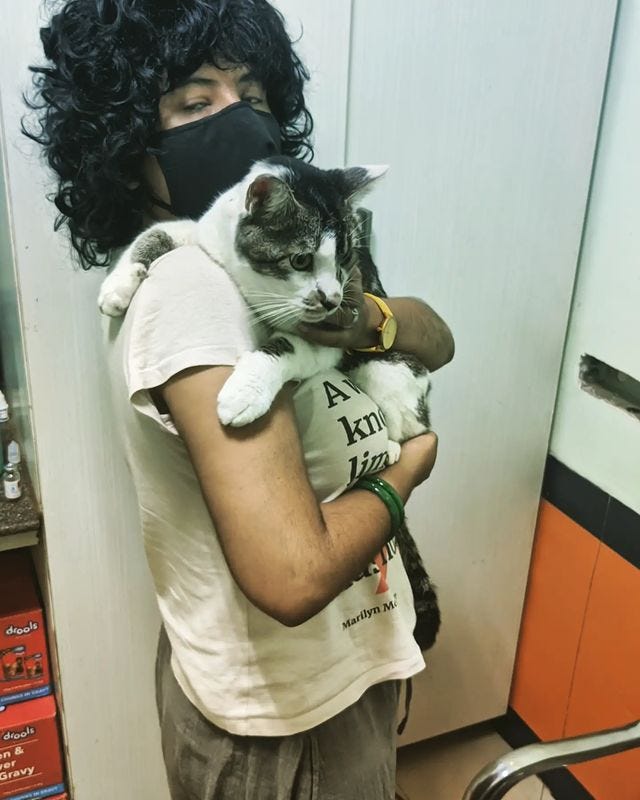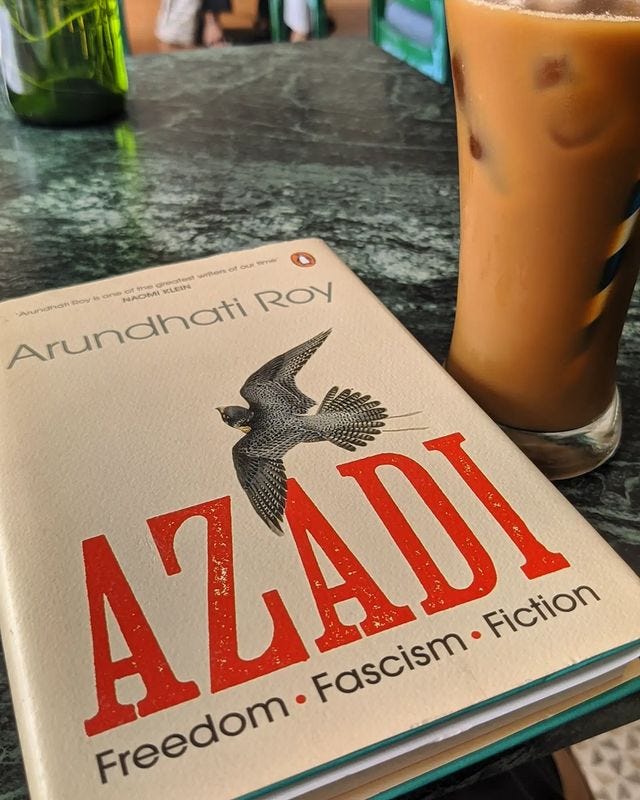My dear cocktail sausages,
I told you na, I’d been taking language classes while I was in Berlin? For those of you who have just joined me: I signed up for an intensive one month course in Berlin while I was there. I would’ve continued in my own slow way: Duolingo and Language Transfer and a small paid-for course on Udemy, and watching Netflix shows in German with English subs and vice versa, and all these things are great, and helped me a lot, but nothing beat actually going to a class and speaking my first fumbling sentences out loud in a room that was also full of beginners. I also thrived, I realised, on the competition. It’s terrible, and I did also say pious things to people like, “Don’t worry, we’re all here to learn!” but secretly, I was thinking, “Except me, I’m here to crush it.” The class helped me get more confident, the competition aspect helped motivate me to do my homework and also use my little baby German wherever I went. I got pretty good pretty fast (K’s completely unbiased opinion) and this was also good because in order to apply for a spouse visa (what the Germans call a “family reunification” visa) I need to show them that I can speak at an A1 level. Which means passing an exam. It’s not very nice of the Germans, I can’t think of many other countries that make you pass a language exam, it seems unnecessarily exclusionary, but what are you going to do, right? You can’t tell them that like all reasonable people you expect you will pick up some German while you’re living there (this rule only applies to people under 15, the idea being that the older you are, the harder it is to learn), so you must demonstrate in three parts: hearing, writing and oral, that your German is good enough to be allowed in.
COVID fall-out touched the Goethe exams as well, half the centres across the city are closed so people flew in from all around the country to sit the exam in Delhi. In my room, the smallest of all of them, there was a woman from Gujarat and another woman from Afghanistan. It was mostly women, I did a quick check when I went outside to wait for the oral exam, only two men behind me, only two walking out of the room where the oral exam was in the whole time I sat there. My teacher at German school had said something different, she said A1 and A2 were usually the only two levels you saw men at, after that, when we climb into the Bs and Cs, she said, they mostly disappear. I had noticed they (the men) were less forthcoming also, except for a Colombian doctor who worked in Sweden and was in Berlin for a quick holiday so decided to learn German really fast. He talked in class but he didn’t socialise with us during our coffee break, and he missed the last week of lessons altogether. The Palestinian man didn’t socialise at all, walking off with his coffee and his phone, but he brought in chocolate for his birthday and he was the only one of the four men who joined our little class for a farewell meal before we all dispersed.
The week had already been stressful for me. Bruno, our brindle tabby, had lost a noticeable amount of weight when I returned. K came back a little after I did, and I thought maybe Bruno missed us and was off his food, so we pampered him and fed him wet food and chicken and all sorts of delicious things and kept the cat flap closed so he couldn’t go outside, but one week later, we had to admit that it wasn’t working, so we took him to the vet. Turned out he had a kidney infection, so we’ve been going back and forth to the vet every day for the last ten days. His second blood test came back showing signs of improvement though, so we are just to give him drips twice a day and then test him again. Of course we love him and we are happy to do it, but it has put a bit of a spanner in the plans we made so gloriously before we came back to Delhi.
Every morning therefore we went to the vet, and sat in a waiting room filled with people worried about their pets, the same language. People bringing their sick pets in don’t have much to say to anyone else, you can tell the ones who have come for minor things by how they bounce in, delightedly leading a fat labrador (why are all the labradors so grotesquely obese?) or holding a little Yorkie, or controlling a pit bull puppy who is waddling his front feet in the air despite his cone of shame. Those of us with sick pets just sit, cage on laps, or dog bundled in a towel or old dog by our feet. We don’t make eye contact, we barely look at our phones. We murmur to our pets, stroking them gently to keep them calm. It’s a kindred feeling, all of us separate but together. You tell me how your dog hates to be given a drip, I tell you how my cat’s kidneys might be failing. We understand in a way the healthy animal owners do not.
The other morning, walking in, I saw the whole waiting room tense and turn towards one exam room. The big glass window was a picture view. I thought it was just a golden retriever being given a drip, I didn’t understand why there was this palpable air of tense waiting. A young woman had her hands clasped over her mask, it took me a little while to see her as the owner, the same instant that I realised that our vet wasn’t giving the golden a drip after all, his hands were thudding on the dog’s chest, the heels of his palms pressing then stopping. He was giving the dog CPR. The force of his hands made the dog move but was he breathing on his own? We stood behind the girl in silent vigil until I finally thought to sit down. By then she had doubled over on herself and was weeping loud sobs that sounded like they were wrenched out of her. I saw her try to go in and her male companion who was inside with the dog stop her in a you don’t want to see this gesture. We all said nothing, the woman on our other side was also weeping, even though she wasn’t connected to this girl at all. I felt hot tears in my eyes and a lump in my throat and frightened, I tried to disassociate, to imagine myself writing it down instead. Her sobs turned into a howl, the dog was dead. Next to her was another dog, the dead one’s companion, he made an eager barking noise and tried to go in to his friend. We were shown into our exam room and I could hear her crying through the walls.
There’s the time that even a shared language fails you. My sick but alive pet, her dead one. No way to cross the breach of just a few steps and touch her on the shoulder and tell her it’s going to be okay.
I found myself immersed in German as I learnt it. Suddenly, things had meaning. I’d never taken a language course before in the country of that language. My first lessons: who am I, how old am I, where do I come from, someone asked me all those questions in real life not one week later. It was such an astounding feeling: these words I am learning to say, they mean something to other people!
I did a sample lesson of French and one of Spanish back in the day. Our teachers were Indian, our class was Indian, we spoke English again as soon as we exited. Forgive me for not thinking of those as “real” languages, only something that existed in a classroom. Oh sure I knew there were countries where they were spoken, but they may as well have been on the moon.
“It’s so funny to think of you speaking a different language,” said a friend to me, and I knew what she meant. I watched my Bombay friend and my Delhi friend, both in Berlin now, speak basic German to people, I watched a new acquaintance actually banter in German with her German friends, and I thought, “Wow, look at them speaking a foreign language.”
My German is slow, painstaking. I feel my face contort, my eyes get smaller. Words don’t come to my head automatically, I have to recall each one from the soft spot in my brain they have lodged themselves in, like yanking out teeth. “I… am…going..,” I say, “to… the… shop…buying…chicken.” Some Germans watch my mouth anxiously as I talk, eager to catch every word as it emerges. Others wait patiently, and respond so quickly I have no time to make up my next sentence. Everyone is nice to me as I learn, and I also learn body language as I go along, how someone will be impatient because it is a busy day, who to approach if I am lost or need a lighter for my cigarette, who to catch eyes with and smile. Two languages, side by side.
English is not a language I think much about as I’m using it. I mean, English is like my skin, I inhabit it fully, bumps and warts and cuts and all. I never have to think about English, if I wanted to just let my tongue go loose and babble, I could without so much as a slight flex of my brain. Writing things down is different, of course. When I write, I am deliberate. I have to be because to convey the very vaguest of thoughts in my head, like this one, for example: explain English, I must construct a precise sentence using words that will take the thought straight from my head into yours. I’m making you see what I’m thinking, in other words. This requires knowing and loving a language.
After my exam, I had some time to kill and so I went to the Full Circle bookstore in Khan Market and bought myself a copy of Arundhati Roy’s Azadi and then went upstairs to the cafe to read it, and lo and behold, the very first essay was about language. (Here it is to read online.) In it, Ms Roy is talking about what languages belong to us, and whether as Indians, we can ever claim to own English. It’s a conversation that happens again and again, especially around Indian writers, there’s a whole divide between the writers who write in vernacular languages and those of us that do in English. We feel, I think, slightly guilty for our English skills, in India it’s very much associated with being elite, being posh, and so our writing must also be posh, is the argument. They feel—as far as I’ve read—resentful that Indian writing in English always gets more attention than Indian writing in any other language.
But as the years go by, I realise English belongs to me as much as it did to Shakespeare or Mark Twain or Jane Austen or, or, anyone. It began as a coloniser language, but we all learnt it, all over the globe, it’s how we communicate with each other in the absence of other tongues.
Our new landlady in Berlin asked me, “So do you write in your own language?” and for the life of me, I cannot recall if I said, “Yes, I write in English” or “No, I write in English.”
My German is halting, but my Hindi is only instructive. In North India, where I have grown up speaking Hindi all my life since I was barely three, this is a function of my privilege. I haven’t practised Hindi except to ask for things. I get only so far in conveying my thoughts, the more complicated they become, the more tongue tied I get. Once, in school, they asked us to write a short essay on “kissa kursi ka” which I translated to mean “the story of a chair” which it is, very literally, but which also refers to, in this case, the story of a political chair. I was meant to write about elections, I wrote the life story of a chair, from wood to death.
After the reading and writing portions of our exam, we all sat around in that small room, waiting for them to begin the oral section, and so we all got talking, except for this one woman who sat quietly by herself. “Where are you from?” asked one of the others, and she said, “Afghanistan.”
(Which led to a whole lot of extremely frustrating loud tactless remarks from two of the women there where this poor woman was asked in varying order: a) how Istanbul was these days, b) how come the Taliban let her fly, c) the difference between a hijab and a burkha, and d) not a question, just an observation that all the refugees left in Afghanistan and elsewhere were uneducated because the educated ones left ages ago.) (At that last one, I, who had been trying to rehearse my German in my head, also had to say something because otherwise it was only the third Indian in the room, who was trying to fight a losing battle with the other two over some of their remarks.)
Anyway the Third Woman suggested to the rest of us that we switch to Hindi, it being closer to Urdu, which was closer to… Pashtun? I don’t know the logic, but as soon as she said it, I felt every single word of Hindi I’d ever learnt wing its way out of my head and through the open window. I could remember German, I could remember English, but for the life of me I could not form one single Hindi sentence. It was like I was paralysed, able to hear and understand everything around me, but unable to speak. So when I did speak to the Afghani woman later—we were partners for our oral exam—it was in a mix of English and broken German.
Maybe it was a way of aligning myself away from Indian women just like me, with similar accents and similar sensibilites and their way of not thinking about a world that existed beyond them. Maybe I didn’t want to speak Hindi any more in that room if that was where Hindi was going to take me. Maybe it was just a track change, if I am translating English to German in my head, I can’t simultaneously translate English to Hindi. Maybe every time you pick up a new language you have to lose others for a while, just until you learn.
Phew. What a very long letter to inflict upon you all! If you liked my ramblings, consider buying me a coffee? If you’d rather short and pithy updates, consider buying me a coffee also! Win-win for all of us.
Oh boy do I have a lot of links for you this week:
Guys please read this delicious drama that NYT somehow decided was worth a whole novella.
Love this Substack about how to figure out where people are by their photos (& therefore protect yourself more.)
On bestiality and whether animals can consent.
I just love gossip about new media.
Picky puppy food journal.
I also really love negative restaurant reviews when they’re done so cleverly.
Have a great week!
xx
m
Where am I? The Internet Personified! A mostly weekly collection of things I did/thought/read/saw that week.
Who are you? Meenakshi Reddy Madhavan, writer of internet words (and other things) author of seven books (support me by buying a book!) and general city-potter-er.
Follow me on Twitter, Facebook and Instagram. (Plus my book recommendation Instagram!)
Got sent this newsletter? Sign up here to subscribe!
Forward to your friends if you liked this and to people who really should think before they speak if you didn’t.
Also, write back to me! I love to hear from you.






No comments:
Post a Comment
Thanks for your feedback! It'll be published once I approve it. Inflammatory/abusive comments will not be posted. Please play nice.